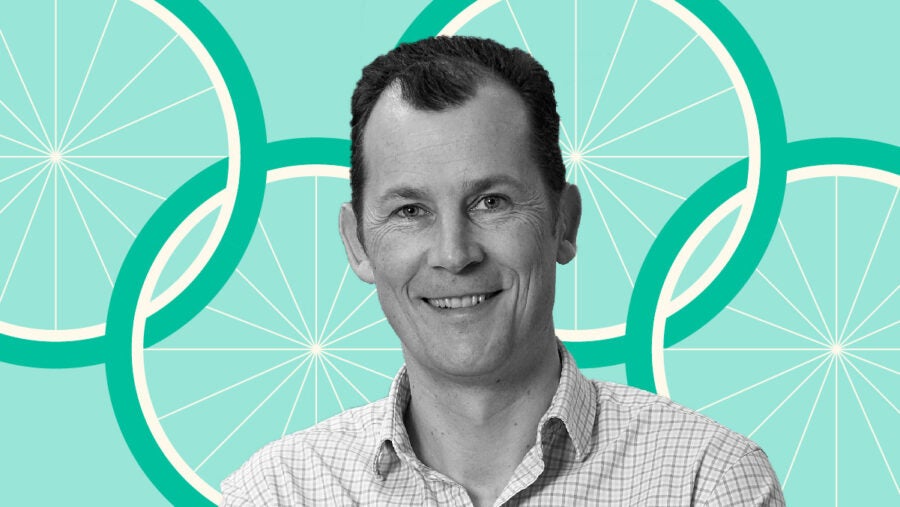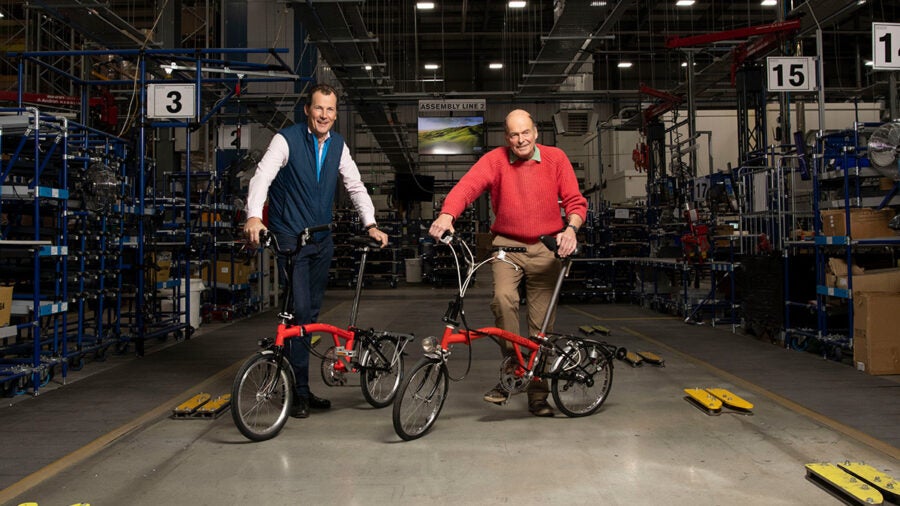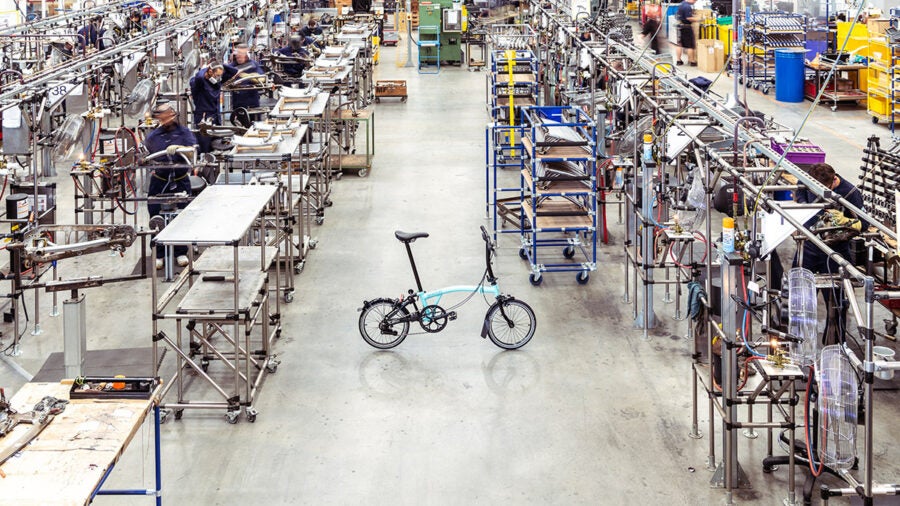
Will Butler-Adams shows off Brompton Bicycle’s factory and HQ in Greenford, west London, with an energy comparable to that of a child showing off their Christmas presents. While you’d expect every business leader to talk up their company, his elevator pitch is earnest to the point of being impassioned.
“They’re a mind-blowing bit of kit,” he says of his firm’s famous folding bikes. “They’re empowering. They let people have real fun and freedom in cities.”
Will Butler-Adams CV
2008-present: CEOrn2005-08: engineering directorrn2002-05: project manager
2000-02: plant manager
1997-2000: project manager
Butler-Adams provides an enthusiastic guided tour of the 8,000 sq m site, which juxtaposes powerful robotics with intricate human skill in the working bays of the main hall. Next to that, there is a Brompton museum, which charts the company’s rise from a cycling eccentricity to an internationally recognisable product. Upstairs, in addition to offices and conference rooms, there is a social space complete with a ping-pong table.
Butler-Adams, who studied engineering at Newcastle University, says that he’s a naturally curious person. He first learnt about Brompton during a chance encounter with the firm’s then chairman, Tim Guinness, on a London bus in 2002.
After working in project management roles for chemical companies ICI and DuPont, at 28 he had planned on enrolling at Insead, the French business school. “But then I heard about this really cool bike and I just needed to find out more,” he explains.
Guinness introduced him to Andrew Ritchie, Brompton’s founder and inventor. Butler-Adams was offered a job and, by 2005, he was engineering director. Three years later he led a management buyout and became CEO.
Taking Brompton into the mainstream
When Butler-Adams joined Brompton, it had about 40 employees; operated from a cramped and cluttered warehouse in Brentford; used “very little in the way of technology”; and was making roughly 6,000 bikes a year. The company was profitable, but unable to satisfy the demand he thought this “brilliant little thing” was bound to create “if it was marketed properly”.
Butler-Adams describes Ritchie as “a genius. He’s just like Leonardo da Vinci. I mean, look at this,” he says, pointing at one of the original sketches of a Brompton bike that takes pride of place on his office wall. “But there are two sides to a business: one is to conceive and the other is to communicate. You can have the best idea in the world, but it won’t get anywhere unless people know about it.”

As CEO, Butler-Adams has overseen an evolution in strategy, including outsourcing some non-core manufacturing processes, relocating the business, adopting new tech such as 3D printing and increasing the staff headcount to about 800.
And, where his predecessor was more reserved, the gregarious Butler-Adams is happy to evangelise about Brompton in the press. He sees media opportunities, particularly in the digital age, as one of the key elements of doing business.
“I think it’s good to talk,” he says. “I spend time doing interviews because someone might see an article and say, ‘Oh that’s really interesting.’ They might not know about us, but then they get that spark and go and find out more.”
Navigating a world in crisis
Brompton has enjoyed strong growth since Butler-Adams took the helm, but, like so many other British businesses, it’s been finding life a little more challenging of late. The firm sold its millionth bike in December 2022 and, for the year ending 31 March 2022, its revenues were up 40% year on year to a record £106.9m. Despite this, its pre-tax profit for the same period fell by 24% to £7.3m, largely because of wage inflation and the rising cost of materials.
Butler-Adams points at enduring problems caused by “bloody Brexit”, rising energy bills, the Covid pandemic and the cost-of-living crisis. The company’s supply chain is affected by Russia’s invasion of Ukraine and the increasing tensions between China and Taiwan. Both Ukraine and Taiwan produce titanium, which is used in Brompton’s frames.
You can have the best idea in the world, but it won’t get anywhere unless people know about it
Is this the toughest period of Butler-Adams’s tenure? “No, it’s not,” he stresses. “In the early days, when we were much smaller, we made it through far more fragile moments, where we literally had to throw all our chips on the table.”
Butler-Adams notes that Brompton is vulnerable to fluctuating geopolitical tensions, but he doesn’t believe it’s his place to be political. Instead, he tries to maintain a long-term view of his enterprise and not get too distracted by what’s making the headlines this week.
“You can’t shuffle your business to offset today’s drama. That’s because, as today’s drama disappears, tomorrow’s is developing. What you have to do is try and build a business that is resilient to all manner of impacts, including those that haven’t even come yet.”
While Brompton doesn’t necessarily have plans to change any of its supply lines entirely, Butler-Adams appreciate the need to investigate potential new ones.
“When you’re very small, you might have one supplier because you simply don’t have the volume to need more,” he says. “But, when you get to a certain size, you’ll want to consider your supply. This might be from Europe, from the Americas, from Asia. You don’t want all your eggs in one basket.”
Climate change and clean transport
Another global issue affecting Brompton – and other companies – is the climate emergency. Butler-Adams is not anti-car, accepting that there are times when it’s necessary to drive. He owns a battery-electric Nissan Leaf, but, for short trips, he prefers cycling. He also admits to “not being much of a London guy”, having grown up in North Yorkshire and attended the independent Rugby School in Warwickshire. “I’m most at home in the countryside,” he says.
Yet Butler-Adams acknowledges the “reality” of humanity’s net migration to cities and the problems this has caused. He says: “It is the apparent wisdom of humans, this supposedly apex, super-smart species on Earth, that we have to live in cities. These are often the most unhealthy places to live. The air quality is poor, people aren‘t active and there are obesity problems. How did we let this happen?”

When it comes to city living, Butler-Adams believes that “cars are monstrously inefficient”, pointing out that cycling is a cost-effective way to improve air quality and get people more active.
“It is not sensible to carry a human five miles in a two-tonne metal box. People complain that we don’t have space in cities. Why not? Because there are thousands of cars taking up space. If you have to get somewhere 100 miles away, then take a car by all means. But just to dash to the shops? It’s nuts.”
Access and affordability
Butler-Adams says that Brompton’s target market is anyone who can ride a bike. But not everyone can afford a Brompton. The company’s famous product is priced between £850 and £3,785, depending on the spec.
It’s premium pricing for a premium product, Butler-Adams explains. “We can’t be all things to all people, but price is not what’s stopping people from cycling – I reject that idea. You can buy a basic single-gear bike for £50 second-hand if you want to.”
On Brompton bikes specifically, though, he draws parallels with the smartphone market. He points out that, only a few years ago, it would have seemed implausible that most people would walk around with a computer in their pocket. But flexible payment schemes, contracts and rental opportunities all exist.
It is not sensible to carry a human five miles in a two-tonne metal box
Indeed, Butler-Adams says: “If something is useful, people have a habit of finding a way to afford it. People aren’t going to suddenly stop buying smartphones, for instance.”
As well as offering a range of payment options, Brompton also operates a bike-hire scheme. During the recent train strikes, the company has let people borrow bikes without charging them for the privilege.
“That part of the business doesn’t make a profit,” Butler-Adams says. “In our experience, the biggest barrier to entry for people jumping on a bike is that they haven’t ridden one for years. When you have moments like those [train strikes], the urgency is created. It gives them a chance to see what could be possible.”
Brompton bikes, he adds, should be viewed as investments. “They’re designed to last 25 or 30 years. You’re buying into long-term expertise; you can get maintenance and repairs. These aren’t things that you buy and then don’t use. If people are going to spend their hard-earned money, they’ll want a product that really adds value. That’s what we aim to do.”
Leading from the front
Butler-Adams believes that having frequent, open and honest conversations with employees has been key to his longevity as a CEO.
“I’m very clear on how much profit we make, how much cash we have and how much I earn [£210,000 a year]. It’s important that they can attach a value to everything we’re doing, including what I’m doing.”
He may be the highly visible face of his company, but Butler-Adams stresses that Brompton wouldn’t be the business it has become without teamwork. He claims that he makes a point of paying his staff “around 25% above market rate”.
“I constantly benefit from being around people who are better than me,” he says. “I have certain skills; other people have different skills and I lean on them.”
There can a fine line between stability and stagnancy in business. Does Butler-Adams give any thought to who his successor might be?
“It’s a bit of a British obsession to always be thinking about an exit strategy,” he says. “I’m only 48. I think you should stay in a job as long as you feel that you have something to offer. But you also should be mindful that a company can always benefit from fresh ideas. I’m not in a rush to leave and I don’t want to be written off quite yet. As the business gets bigger and more complex, I still feel I’ve got a lot left to give Brompton.”

Will Butler-Adams shows off Brompton Bicycle’s factory and HQ in Greenford, west London, with an energy comparable to that of a child showing off their Christmas presents. While you’d expect every business leader to talk up their company, his elevator pitch is earnest to the point of being impassioned.
“They’re a mind-blowing bit of kit,” he says of his firm’s famous folding bikes. “They’re empowering. They let people have real fun and freedom in cities.”
Butler-Adams provides an enthusiastic guided tour of the 8,000 sq m site, which juxtaposes powerful robotics with intricate human skill in the working bays of the main hall. Next to that, there is a Brompton museum, which charts the company’s rise from a cycling eccentricity to an internationally recognisable product. Upstairs, in addition to offices and conference rooms, there is a social space complete with a ping-pong table.
